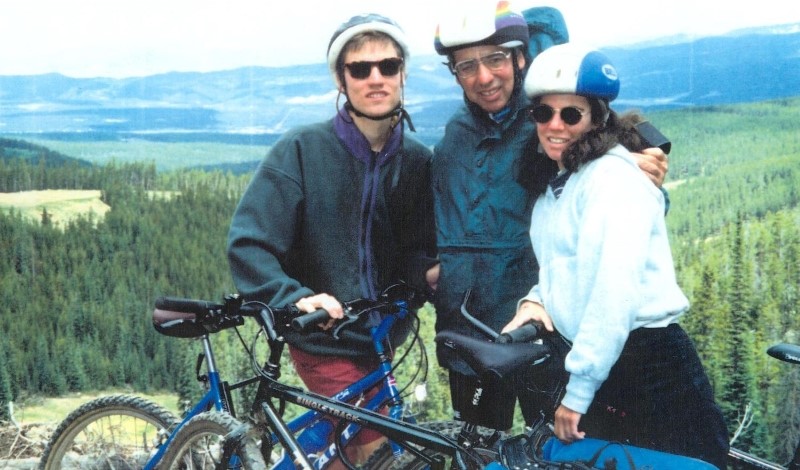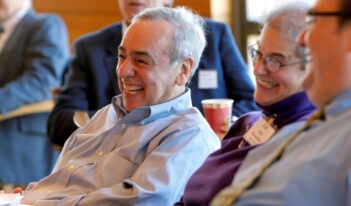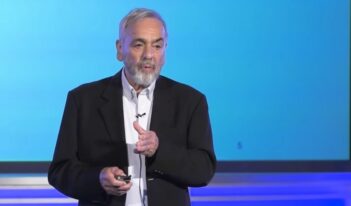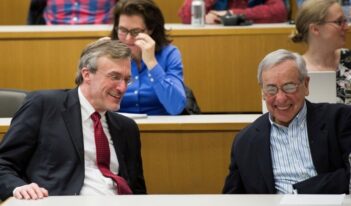
The bicycle was my father’s vehicle of choice and a metaphor for how he chose to live his life.
My father was most at home on his bicycle. To me, the bicycle was both his vehicle of choice and a metaphor for how he chose to live his life—always moving, pedaling hard on the uphills, squealing with delight on the downhills, pushing me or my brother as children with a hand from behind when we needed extra support, and never getting off to walk, unless it was to keep one of his tired grandchildren company on a particularly long uphill.
Often cycling was a place of beautiful solitude for him, no doubt, but it was also like his living room. Everyone was invited to join him for a ride. Characteristically, he bought each of his grandchildren their first bike, not only so that they could venture out on their own, but also so that they could ride with him. Much to his wife, Gail’s, justified dismay, when he didn’t have company, he rode with his headphones on, listening to music or, ideally, speaking on the phone with one of his children or colleagues. He and I had some of our best conversations while he was riding home from his office at Penn, or during COVID years, when he was on one of his long daily rides around Philadelphia. When he discovered that Gail had secretly re-gifted to me the 10-speed he had bought for her birthday years ago, my dad was not deterred; he went out and got her a tandem so they could ride together on a bicycle made for two.
My dad loved the bike because it’s so simple: “You just jump on and go,” he used to say. And, at the same time, it’s incredibly complex: the wheel is one of the most complicated inventions that humanity has ever seen, and a bicycle has two! The gears, chains, brakes, and gadgets he loved are not unlike the formulas of microeconomics and game theory that came easily to him and underlay his life’s work. Of course, he loved the bicycle: it’s an ingenious answer to a complicated set of life’s obstacles and human desires. The freedom to move, the joys of discovery, endless opportunities for both independence and connection. This combination of simplicity and complexity seems to define how my father approached so many things in his life. To go on a bike ride in the fresh air is a beautiful thing. If everyone did it, he believed, we would all be healthier, enjoy ourselves more, and produce fewer greenhouse gasses, together.
My father took his bicycle everywhere, including taking a folding Bike Friday in a suitcase to visit me in Nepal when I was doing research. There, he rode throughout Kathmandu at dawn before trucks, rickshaws, and cars clogged the streets with traffic and pollution. On the bike, he combined work and play. His academic and policy work was a deep source of pleasure and fun, and our holidays always involved some kind of physical or intellectual challenge. As children, Joel and I had many vacations that took place exclusively on bicycles, including through the vineyards of France and the river valleys of Italy. My mother grew up among three very athletic brothers, and she shared a love of intense outdoor activity with my father. Still, like all of us, she often had to temper his enthusiasm. While my father would have preferred to camp outside every night, my mother had the good mind to insist that we stay in a small hotel so we could occasionally get a shower and a proper meal. One of my graduate school friends, after hearing some of these bike tales, blurted out with intentional exaggeration, “I bet your family has even ridden home from the airport!” But I’m afraid this was no exaggeration. After spending two years living abroad in Vienna, Austria, my dad insisted that we ride our bikes home from the Philadelphia airport. He drove back later on his own to collect our luggage. For my dad, ever the irrational economist, it was the perfect way to return home.
Biking was also a way to manage pain. Whenever either my brother Joel or I experienced the emotional tumult of being teenagers, our father offered a simple solution: “Take a bike ride, that’s what I do.” After the tragic accident that ended our mother’s life, my father immediately secured a job for Joel at a bike store. It was also during this period of mourning that Joel and our dad did their first “century,” a 100-mile ride, about which Joel has countless stories he shares with us. When my dad met Gail several years after the accident, one of the first questions he asked her was whether she liked to bike. She did not. And yet with joy, humor, and a spirit of adventure Gail embraced the bike with him, both as a vehicle and as a way of life.
By March 2022, we knew something was very wrong. I was on the phone with my dad daily, trying to convince him that he needed to go to the doctor soon. The whole family worked together to make this happen. Gail’s son, Michael, and his wife, Julia, called me on one Saturday morning, after hearing my dad speak, agreeing that he needed medical attention and further coaxing. I then phoned from Minnesota and worked with Gail’s other son, David, to finally get him to agree to go to the emergency room. It was still fairly early in the morning and as we were saying goodbye, I heard Gail calling from the other room, “Okay, Howard, you can go on your bike ride now and I’ll get dressed!” He had just bought a new, fancy bike, a week or so earlier. I gently intervened, saying “No, no, Dad, you should not get on your bike right now,” and they prepared to go directly to the doctor. I think that somewhere deep inside, Gail knew that this might be his last ride—and she really wanted him to have that.
He did not get to have his last ride outside, but he did spend a lot of time over the first several months of his illness on the stationary bikes in the gym. Not surprisingly, it was often hard to get him to stop, even when he was physically exhausted. But as a way of life, he never stopped. He explored and expanded his interests down roads he had never before taken. Losing much of his language and the ability to read and write—his main forms of expression throughout his life—he took up gardening with his colleague Mark Pauly, as well as painting and coloring. With characteristic intensity, I recall him telling me sometime in February 2023 that his main work now was color. His office, where he wrote all his articles and books, soon became a gallery full of color.
It is said that during one’s last phases of life, we return to the memories, songs, and music of childhood. Taking a cue from Nepali practices of death, I spent the last few days of my father’s life sitting with my father and singing. All of his most fondly remembered songs from childhood had to do with the bicycle, songs like “Daisy Bell (Bicycle Built for Two)”—a song that became the first example of IBM speech synthesis in the early 1960s, or “When You Ride a Bicycle”—a children’s song about safety while riding. Although he could not say anything, I knew he could hear and recognize my voice. And I knew that he would be soothed by thoughts of a bike ride as he transitioned away from life.
In the last few months of my father’s life, Gail continually asked my brother Joel to take my dad’s bike. But none of us could manage that. Once Joel finally agreed to store it in his garage, numerous plans to pick it up never materialized. I get it. It was the hardest one of his belongings for us to move because the bike is like his signature—a sign of his autonomy, his freedom, his will, his joy. Joel picked up the bicycle three days after my father passed. Just a year after my dad’s passing, we gave my husband, Daniel, this bike to take with him to Hartford, Connecticut. Daniel now rides the bike to and from the state capitol, just as my father did to Penn. The bike has become a daily moment of remembering and remains the vehicle of choice for both play and work.
This essay is part of a series celebrating the life and scholarship of Howard Kunreuther, titled “Commemorating Howard Kunreuther.”




